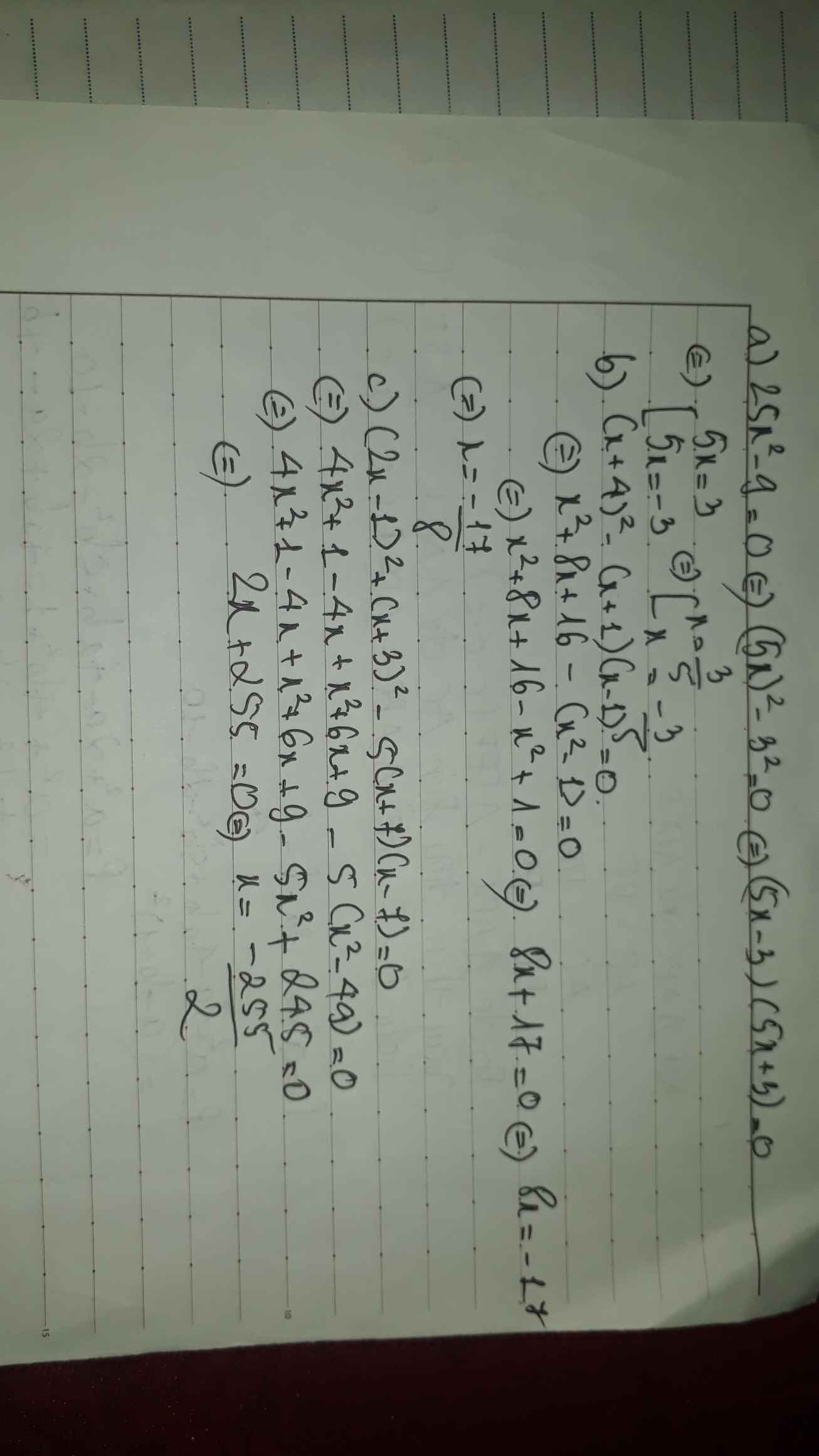

Hãy nhập câu hỏi của bạn vào đây, nếu là tài khoản VIP, bạn sẽ được ưu tiên trả lời.



a/ \(25x^2-9=0\)
<=> \(\left(5x-3\right)\left(5x+3\right)=0\)
<=> \(\orbr{\begin{cases}5x-3=0\\5x+3=0\end{cases}}\)
<=> \(\orbr{\begin{cases}5x=3\\5x=-3\end{cases}}\)
<=> \(\orbr{\begin{cases}x=\frac{3}{5}\\x=-\frac{3}{5}\end{cases}}\)
b/ \(\left(x+4\right)^2-\left(x+9\right)\left(x-1\right)=16\)
<=> \(x^2+8x+16-x^2+8x-9=16\)
<=> \(16x+7=16\)
<=> \(16x=9\)
<=> \(x=\frac{9}{16}\)
a) \(25x^2-9=0\)
\(\Leftrightarrow\left(5x-3\right)\left(5x+3\right)=0\)
\(\Leftrightarrow\orbr{\begin{cases}5x-3=0\\5x+3=0\end{cases}\Leftrightarrow\orbr{\begin{cases}5x=3\\5x=-3\end{cases}\Leftrightarrow}\orbr{\begin{cases}x=\frac{3}{5}\\x=-\frac{3}{5}\end{cases}}}\)
Vậy S = {3/5 ; -3/5}
b) \(\left(x+4\right)^2-\left(x+9\right)\left(x-1\right)=16\)
\(\Leftrightarrow\left(x+4\right)^2-4^2-\left(x+9\right)\left(x-1\right)=0\)
\(\Leftrightarrow\left(x+4-4\right)\left(x+4+4\right)-\left(x+9\right)\left(x-1\right)=0\)
\(\Leftrightarrow x\left(x+8\right)-\left(x+9\right)\left(x-1\right)=0\)
\(\Leftrightarrow x^2+8x-x^2-8x+9=0\)
\(\Leftrightarrow9=0\left(vl\right)\)
Vậy S = \(\varnothing\)

b/
=> x2 + 8x + 16 - x2 - 1 = 16
=> 8x + 15 = 16
=> 8x = 1
=> x = 1/8

a) ( 3x - 1 ) ( 2x + 7 ) - ( x + 1 ) ( 6x + 5 ) = 16
<=> 6x2 + 21x - 2x - 7 - ( 6x2 - 5x + 6x - 5) = 16
<=> 6x2 + 21x - 2x - 7 - ( 6x2 + x - 5 ) = 16
<=> 6x2+ 21x - 2x - 7 - 6x2 -x + 5 = 16
<=> 18x - 2 = 16
<=> 18x = 18
=> x = 1
Vậy....

Bài 1:
a) (5x-4)(4x+6)=0
\(\Leftrightarrow\orbr{\begin{cases}5x-4=0\\4x+6=0\end{cases}\Leftrightarrow\orbr{\begin{cases}5x=4\\4x=-6\end{cases}\Leftrightarrow}\orbr{\begin{cases}x=\frac{4}{5}\\y=\frac{-3}{2}\end{cases}}}\)
b) (x-5)(3-2x)(3x+4)=0
<=> x-5=0 hoặc 3-2x=0 hoặc 3x+4=0
<=> x=5 hoặc x=\(\frac{3}{2}\)hoặc x=\(\frac{-4}{3}\)
c) (2x+1)(x2+2)=0
=> 2x+1=0 (vì x2+2>0)
=> x=\(\frac{-1}{2}\)
bài 1:
a) (5x - 4)(4x + 6) = 0
<=> 5x - 4 = 0 hoặc 4x + 6 = 0
<=> 5x = 0 + 4 hoặc 4x = 0 - 6
<=> 5x = 4 hoặc 4x = -6
<=> x = 4/5 hoặc x = -6/4 = -3/2
b) (x - 5)(3 - 2x)(3x + 4) = 0
<=> x - 5 = 0 hoặc 3 - 2x = 0 hoặc 3x + 4 = 0
<=> x = 0 + 5 hoặc -2x = 0 - 3 hoặc 3x = 0 - 4
<=> x = 5 hoặc -2x = -3 hoặc 3x = -4
<=> x = 5 hoặc x = 3/2 hoặc x = 4/3
c) (2x + 1)(x^2 + 2) = 0
vì x^2 + 2 > 0 nên:
<=> 2x + 1 = 0
<=> 2x = 0 - 1
<=> 2x = -1
<=> x = -1/2
bài 2:
a) (2x + 7)^2 = 9(x + 2)^2
<=> 4x^2 + 28x + 49 = 9x^2 + 36x + 36
<=> 4x^2 + 28x + 49 - 9x^2 - 36x - 36 = 0
<=> -5x^2 - 8x + 13 = 0
<=> (-5x - 13)(x - 1) = 0
<=> 5x + 13 = 0 hoặc x - 1 = 0
<=> 5x = 0 - 13 hoặc x = 0 + 1
<=> 5x = -13 hoặc x = 1
<=> x = -13/5 hoặc x = 1
b) (x^2 - 1)(x + 2)(x - 3) = (x - 1)(x^2 - 4)(x + 5)
<=> x^4 - x^3 - 7x^2 + x + 6 = x^4 + 4x^3 - 9x^2 - 16x + 20
<=> x^4 - x^3 - 7x^2 + x + 6 - x^4 - 4x^3 + 9x^2 + 16x - 20 = 0
<=> -5x^3 - 2x^2 + 17x - 14 = 0
<=> (-x + 1)(x + 2)(5x - 7) = 0
<=> x - 1 = 0 hoặc x + 2 = 0 hoặc 5x - 7 = 0
<=> x = 0 + 1 hoặc x = 0 - 2 hoặc 5x = 0 + 7
<=> x = 1 hoặc x = -2 hoặc 5x = 7
<=> x = 1 hoặc x = -2 hoặc x = 7/5

Bài1:
\(a,\left(2x+3\right)^2-\left(2x+1\right)\left(2x-1\right)=22\\ \Leftrightarrow\left(2x+3\right)^2-4x^2+1=22\\ \Leftrightarrow\left(2x+3-2x\right)\left(2x+3+2x\right)=21\\ \Leftrightarrow3\left(4x+3\right)=21\\ \Leftrightarrow4x+3=7\\ \Leftrightarrow4x=4\\ \Leftrightarrow x=1\\ Vậy....\\ b,\left(2x-1\right)^3-4x^2\left(2x-3\right)=5\\ \Leftrightarrow8x^3-12x^2+6x-1-8x^3+12x^2=5\\ \Leftrightarrow6x=6\\ \Leftrightarrow x=1\\ Vậy...\)
Các câu sau cũng như thế
Bài2:
\(A=x^2+20x+9\\ =\left(x^2+20x+100\right)-91\\ =\left(x+10\right)^2-91\)
Với mọi x thì \(\left(x+10\right)^2\ge0\\ \Rightarrow\left(x+10\right)^2-91\ge-91\)
Hay \(A\ge-91\)
Để A=-91 thì
\(\left(x+10\right)^2=0\\ \Leftrightarrow x+10=0\\ \Leftrightarrow x=-10\)
Vậy...
\(B=4x^2+5x+7\\ =\left(4x^2+5x+\dfrac{25}{16}\right)+5,4375\\ =\left(2x+\dfrac{5}{4}\right)^2+5,4375\)
Với mọi x;y thì \(\left(2x+\dfrac{5}{4}\right)^2+5,4375\ge5,4375\)
Hay \(A\ge5,4375\)
Để \(A=5,4375\) thì \(\left(2x+\dfrac{5}{4}\right)^2=0\\ \Leftrightarrow2x+\dfrac{5}{4}=0\\ \Leftrightarrow x=\dfrac{-5}{8}\)
Vậy....

Bài 1 :
a, \(\left(x-3\right)^2-4=0\Leftrightarrow\left(x-3\right)^2=4\Leftrightarrow\left(x-3\right)^2=\left(\pm2\right)^2\)
TH1 : \(x-3=2\Leftrightarrow x=5\)
TH2 : \(x-3=-2\Leftrightarrow x=1\)
b, \(x^2-2x=24\Leftrightarrow x^2-2x-24=0\)
\(\Leftrightarrow\left(x-6\right)\left(x+4\right)=0\)
TH1 : \(x-6=0\Leftrightarrow x=6\)
TH2 : \(x+4=0\Leftrightarrow x=-4\)
c, \(\left(2x-1\right)^2+\left(x+3\right)^2-5\left(x+2\right)\left(x-2\right)=0\)
\(\Leftrightarrow4x^2-4x+1+x^2+6x+9-5\left(x^2-4\right)=0\)
\(\Leftrightarrow2x+30=0\Leftrightarrow x=-15\)
d, tương tự

\(x\left(2x-7\right)-4x+14=0\Leftrightarrow\left(x-2\right)\left(2x-7\right)=0\Leftrightarrow\left[{}\begin{matrix}x-2=0\\2x-7=0\end{matrix}\right.\Leftrightarrow\left[{}\begin{matrix}x=2\\x=\frac{7}{2}\end{matrix}\right.\)
\(x^2\left(x-1\right)-4\left(x-1\right)=\left(x^2-4\right)\left(x-1\right)=\left(x-2\right)\left(x+2\right)\left(x-1\right)=0\Leftrightarrow\left[{}\begin{matrix}x-2=0\\x+2=0\\x-1=0\end{matrix}\right.\Leftrightarrow\left[{}\begin{matrix}x=2\\x=-2\\x=1\end{matrix}\right.\)
\(x^4-x^3-x^2+x=x\left(x^3+1\right)-x^2\left(x+1\right)=x\left(x+1\right)\left(x^2-x+1-x^2\right)=x\left(x+1\right)\left(1-x\right)=0\Leftrightarrow\left[{}\begin{matrix}x=0\\x+1=0\\1-x\end{matrix}\right.\Leftrightarrow\left[{}\begin{matrix}x=0\\x=\pm1\end{matrix}\right.\)
a) \(x\left(2x-7\right)-4x+14-0\Leftrightarrow2x^2-11x+14=0\Leftrightarrow2x^2-4x-7x+14=0\Leftrightarrow2x\left(x-2\right)-7\left(x-2\right)=0\Leftrightarrow\left(2x-7\right)\left(x-2\right)=0\Leftrightarrow\left[{}\begin{matrix}x=3,5\\x=2\end{matrix}\right.\)
b) \(x^2\left(x-1\right)-4x+4=0\Leftrightarrow x^2\left(x-1\right)-4\left(x-1\right)=0\Leftrightarrow\left(x-1\right)\left(x-2\right)\left(x+2\right)=0\Leftrightarrow\left[{}\begin{matrix}x=1\\x=2\\x=-2\end{matrix}\right.\)
c) \(x+x^2-x^3-x^4=0\Leftrightarrow x\left(x^3+x^2-x-1\right)=0\Leftrightarrow x\left[x\left(x^2-1\right)+\left(x^2-1\right)\right]=0\Leftrightarrow x\left(x+1\right)\left(x^2-1\right)=0\Leftrightarrow\left[{}\begin{matrix}x=0\\x=1\\x=-1\end{matrix}\right.\)
d) \(2x^3+3x^2+2x+3=0\Leftrightarrow x^2\left(2x+3\right)+2x+3=0\Leftrightarrow\left(x^2+1\right)\left(2x+3\right)=0\Leftrightarrow x=-1,5\left(x^2+1>0\forall x\right)\)
e) \(4x^2-25-\left(2x-5\right)\left(2x+7\right)=0\Leftrightarrow\left(2x-5\right)\left(2x+5\right)-\left(2x-5\right)\left(2x+7\right)=0\Leftrightarrow\left(2x-5\right)\left(2x+5-2x-7\right)=0\Leftrightarrow2x-5=0\Leftrightarrow x=2,5\)
g) \(x^3+27+\left(x+3\right)\left(x-9\right)=0\Leftrightarrow\left(x+3\right)\left(x^2-3x+9\right)+\left(x+3\right)\left(x-9\right)=0\Leftrightarrow\left(x+3\right)\left(x^2-3x+9+x-9\right)=0\Leftrightarrow x\left(x+3\right)\left(x-2\right)=0\Leftrightarrow\left[{}\begin{matrix}x=0\\x=-3\\x=2\end{matrix}\right.\)

a) \(\left(x+2\right)^2-9=0\)
\(=>\left(x+2\right)^2-3^2=0\\ =>\left(x+2-3\right).\left(x+2+3\right)=0\)
\(=>\left(x-1\right).\left(x+5\right)=0\)
\(=>\orbr{\begin{cases}x-1=0\\x+5=0\end{cases}}=>\orbr{\begin{cases}x=1\\x=-5\end{cases}}\)
Vậy x= 1 hoặc x= -5
b) \(x^2-2x+1=25\)
\(=>x^2-2.x.x+1^2=25\)
\(=>\left(x-1\right)^2-25=0\\ =>\left(x-1\right)^2-5^2=0\)
\(=>\left(x-1-5\right).\left(x-1+5\right)=0\)
\(=>\left(x-6\right).\left(x+4\right)=0=>\orbr{\begin{cases}x-6=0\\x+4=0\end{cases}}\)
\(=>\orbr{\begin{cases}x=6\\x=-4\end{cases}}\)
Vậy x= 6 hoặc x= -4
c) \(4x\left(x-1\right)-\left(2x+5\right)\left(2x-5\right)=1\)
\(=>4x\left(x-1\right)-\left[\left(2x\right)^2-5^2\right]=1\)
\(=>4x\left(x-1\right)-4x^2+25-1=0\)
\(=>4x\left(x-1\right)-4x^2+24=0\)
\(=>4x\left(x-1\right)-\left(4x^2-24\right)=0\\ =>4x\left(x-1\right)-4\left(x^2-6\right)=0\)
..................... tắc ròi -.-"
d) \(\left(x+3\right)\left(x^2-3x+9\right)-x\left(x^2+3\right)=15\)
\(=>x^3+27-x^3-3x=15\)
\(=>27-3x-15=0=>12-3x=0=>3\left(4-x\right)=0\)
Vì \(3>0=>4-x=0=>x=4\)
Vậy x= 4
e) \(3\left(x+2\right)^2+\left(2x+1\right)^2-7\left(x+3\right)\left(x-3\right)=28\)
\(=>3\left(x^2+2.x.2+2^2\right)+4x^2+4x+1-7\left(x^2-9\right)=28\)
\(=>3\left(x^2+4x+4\right)+4x^2+4x+1-7x^2+63=28\)
\(=>3x^2+12x+12+4x^2+4x+1-7x^2+63=28\)
\(=>16x+75=28=>16x=-47=>x=\frac{-47}{16}\)
Cậu có thể tham khảo bài làm trên đây ạ, chúc cậu học tốt :>'-'